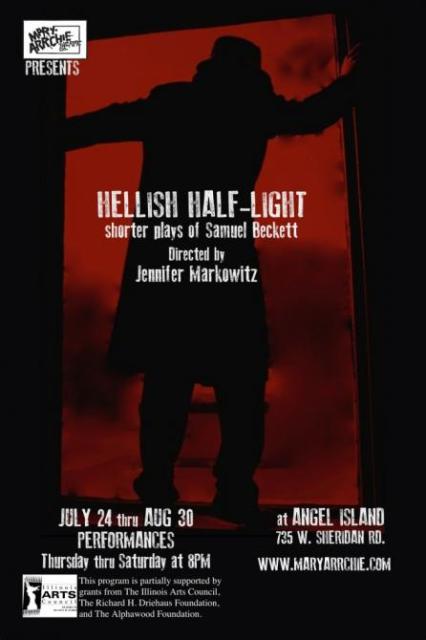
Actors love the plays of Samuel Beckett for the same reasons that audiences hate them. As with his successors, Harold Pinter and Vaclav Havel, they propose a universe steeped in ambiguities itching for performers to lend them coherence. When this mission is accomplished, deep insights into the human condition are revealed. When not, the confusion is enough to trigger howls of frustration in both presenters and witnesses.
The return of Chicago expat Jennifer Markowitz, director of the multiple award-winning Never Come Morning and Hellcab in the 1990s, is alone sufficient to inspire confidence, even when attached to <I>Hellish Half-Light,</I> a medley of six short plays by an author whose definition of "short" can range from hours to instants. Markowitz's recent sojourn in England has rendered her as deft with enigmatic Euro-expressionism as with American realism, however. With the assistance of a half-dozen nimble-footed players sprinting through the bare-bones decor in Mary-Arrchie's likewise spartan loft, the evening clocks in at a brisk 90 minutes.
This ain't no Waiting For Godot, in other words, even if the first playlet proposes a similar dynamic, as a blind street musician and a lame derelict attempt—unsuccessfully—to forge a symbiotic partnership. The second depicts three former schoolgirl-chums, each of whom knows a terrible secret about the other that she will not disclose to its subject. The inevitable inhumanity born of alienation is most severely illustrated by the dilemma of two lawyers reviewing witness statements to a suicide amid the distractions of faulty desk lamps, an abandoned pair of caged birds and the indecision of the victim himself.
Overtly political metaphors may be imposed on the episode depicting jailers who, one by one, find themselves reduced to prisoners, as well as the auteurist director whose guidance transforms his leading man's stance from heroic to submissive. The finale, by contrast, is rooted firmly in the domestic sphere, as a trio of literal talking heads, their bodies encased in what might be crematory urns, recounts a tale of romantic betrayal at warp speed. Since they are mounted on revolving wagons, every corner of the room becomes privy to—well, part of the evidence.
That's right—every corner. While the auditorium's configuration includes a few chairs, playgoers may also be seated on boxes and stools placed around the perimeter of what emerges as an arena, its fourth wall rendered so thin as to be practically transparent. Dress appropriately, lest you find yourself trapped in a sight-line, under scrutiny as existentially merciless as that of Beckett's people.
